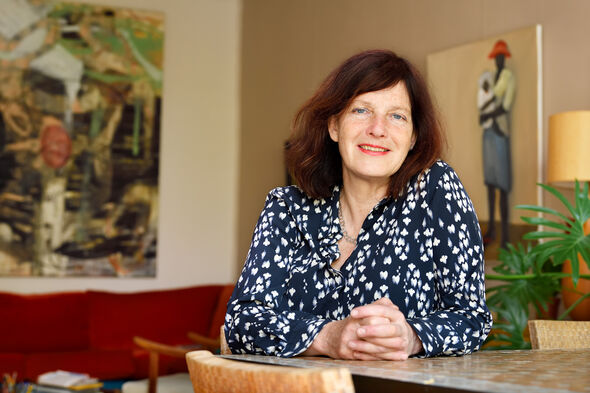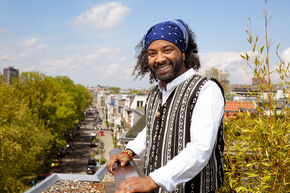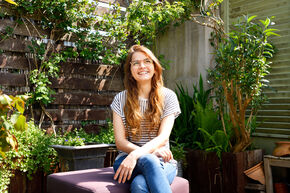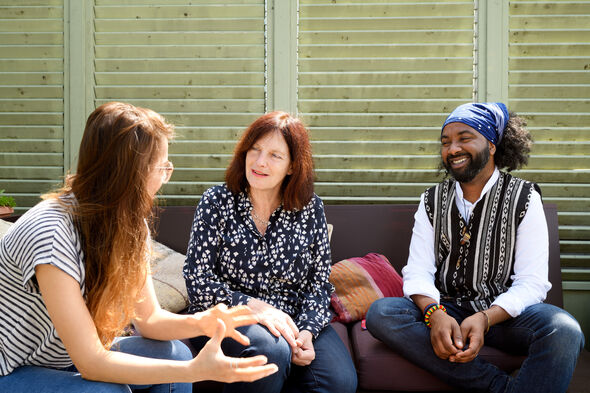
TU/e professor offers asylum seekers lodgings
Takecarebnb matches refugees and host families
A homosexual hotel manager from Malaysia, a Christian low-voltage engineer with the metro from Iran, an Ebola analyst from Uganda; look, three individuals who fled their home countries and came into contact with Ruth Oldenziel. She is chair of the Takecarebnb foundation and is happy to tell Cursor how this role came about and what it means to her. “People who want to flee are people who can flee. They have creativity, flexibility and courage and I find myself learning from them. While what I actually wanted was only to help.”
When Oldenziel was in Munich with a friend in the summer of 2015 - the refugee crisis was daily news for a while following the ineradicable photo of a dead child washed up on a Turkish beach - something happened shortly after their train pulled into the station that had a tremendous impact on her life. “I stood there and saw hordes of people, a great crowd moving through the station. They had just arrived on special trains from Vienna, a city to which they had fled on foot. They were separated from us - ordinary arrivals - by crush barriers. One refugee tried to pass his little son to us, through the fence, to freedom. A futile effort, of course. A shiver still runs down my spine when I think of it.”
She was assailed by the parallel with World War II, during which her mother had been among those in hiding. “What's more this was in Munich, the Nazi capital, where the holocaust had been conceived in the 1930s.” But now refugees were being received by Germans with open arms, welcomed with great kindness and helpful arrangements. The image of the teddy bears and umbrellas that women came to hand over brings a lump to her throat.
“It was Merkel who made that happen. I was there by chance that summer during a sabbatical and as a historian I found it amazing to witness this event. The deeply moving experience of being so close to the stream of refugees – we could touch each other – made me want to help in some practical way.”
Back in the Netherlands, Oldenziel sought contact with the organization Takecarebnb, then still being set up. “A Palestinian refugee came to stay at my home, a business man from Lebanon. He was with me for seven months before I was asked to chair the foundation. Since then I have had more than ten refugees stay at my home.”
Sharing space
Having someone in her home was not such a big step for Oldenziel. “There's a constant stream of international guests coming and going here. I have a small kitchen for them, which means I have the run of my own kitchen. My partner, who lives in a different house, has also taken in refugees in recent years.” But it is never about the square meters, she believes, it is about the space in your head.
“I know someone with a huge house in Amsterdam who supports lots of good causes and likes this project, but who says she has ‘no space’. And I know another woman who lives here in the De Pijp neighborhood in a two-room apartment and who feels she has plenty of room to share. Using a cupboard as a divider, she has created a space where she would like to accommodate someone.”
Anything is better than a center for asylum seekers (AZC) is the line taken by Takecarebnb. “No one can get on with their life again in an AZC,” says Oldenziel. “You aren't allowed to work, you can't learn Dutch effectively, insomnia gets the upper hand as well as stress, everyone is saddled with traumas. In short, terrible circumstances.”
Mo from Sudan and the Iranian Sarah are the latest guests to join her household in Amsterdam. “Sarah is a 3D designer of exhibitions and theater who campaigned for women's rights in her home country. She has a married twin sister in Iran and leaving her behind in the regime weighs heavy on her heart. Sarah is now working for a startup in Utrecht.”
Read on below the box.
Takecarebnb
Takecarebnb was created five years ago to fill the gap between the Central Agency for the Reception of Asylum Seekers (COA) and municipalities, between the Immigration and Naturalisation Service (IND) and VluchtelingenWerk Nederland (a national refugee charity). Over the past five years more than four hundred new Dutch citizens have lodged with a host family, the Annual Report states.
In principle – in other words, on paper – asylum works like this: a refugee arrives in the Netherlands, goes to the COA in Ter Apel, and, if no legitimate reason for accepting them here in the Netherlands is self-evident, is given an interview with the IND. Then a government-assigned municipality looks for housing for them and the process of learning about Dutch culture (inburgering) can begin. In practice it works like this: “There was such a backlog that Mo and Sarah didn't even have their first IND interview. So in their case, I took in two refugees who didn't yet have their residency status,” says Oldenziel. “This is the first time this has happened.” Moreover: in finding a house, municipal wheels often turn slowly. Takecarebnb mediates for status holders and arranges lodgings with private individuals, avoiding the need to stay in a center for asylum seekers, until their own housing is found. This gives the COA space for someone else. A stay lasts three months at most. Then the refugee goes back to a AZC or Takecarebnb looks for new lodgings. Though often the current stay is extended. Sarah and Mo have been with Oldenziel for 18 months now. This is exceptional but understandable: “You want to complete the adventure with them. Offer them space until they have the key to a place of their own. Visit the place together, decorate it together,” she says. And, “It is so enriching, the host also learns a great deal.”
As chair she is delighted to report that Takecarebnb has just signed an agreement with Eindhoven to make a joint effort to recruit host families.
Music
Mo has now found his feet. In Sudan he was a car salesman, but he is also a gifted musician, “He now has three part-time jobs,” Oldenziel says proudly. “Three contracts in sales!”
What she herself has learned, Oldenziel even finds useful in her work as an expert on America. “I've viewed Dutch society through the eyes of the refugees, an enlightening experience. In this phase they are dealing with an utterly incomprehensible government. The forms they have to complete have me – and I'm a professor – completely stumped. I understand that well-intentioned decisions are being made but the impact on these people is inappropriate. It's the little brother of the toeslagenaffaire (the Dutch childcare benefits scandal in which the claimants became victims). I can see that for anyone on the lowest rungs of society, the polder model (consensus politics that can lead to bureaucracy) in Dutch society has spun out of control.”
Ripples
Fortunately, via Takecarebnb she can do something to rectify the situation. “When I help a refugee, I'm throwing a stone in a pond. This personal approach ripples out towards thirty to forty other people. These may be, say, your neighbors, family members and friends.” She's making the point that the knife cuts both ways; the refugee crisis is given a face and the refugee gets a network. A network for life, says Oldenziel, who for many has become a Dutch mother figure.
And don't forget, she emphasizes, any one of us could find ourselves needing to flee. “The people I have gotten to know had their lives in order, just like you and me. Take a look at Turkey, where from one day to the next thirty thousand people were fired from their jobs because they were thought to be hostile to Erdogan. Judges, police officers, you name it.” One of those judges lodged for months with a friend of Oldenziel's. He is finding it particularly difficult to find a job in the Netherlands because the two countries have different legal systems. Heart-wrenching, she feels.
Language
Anyone looking to give a refugee accommodation is given a matching interview with Takecarebnb. Oldenziel recalls the toughest question she was asked: ‘What are you looking for in an asylum seeker?’. This means things like eating together – or not; do you want to maintain your privacy – or share it, and so on. “At first nothing came to mind. But finally I realized that I do think it important that someone wants to learn Dutch. My only condition is that the person makes every effort to do so. It is important to know what you want in your role as host, because you'll be confronted with your true nature. You may think of yourself as being very open then find yourself getting irritated about something you hadn't realized you cherish in your own home. The Takecarebnb matching interview tries to avoid this happening.”
Before we close there is something else she would like to mention. That she sees it as a bad thing that the Dutch language is being set aside so easily at TU/e. “This seems helpful to internationals but they can never settle in properly if they don't learn the language of the country. Please find the patience to talk with them in Dutch. Then, like you, they'll feel at home.”
Ruth Oldenziel is Full Professor of the History of Technology, with a focus on the relationship between America and Europe, at the department of Industrial Engineering & Innovation Sciences. Beyond TU/e she is also well known as an expert on the United States. Since January 2020 she has been editor-in-chief of Technology and Culture, a journal on America's technology history. With her American perspective, she has managed to convey to science funding bodies that Dutch cycling culture is something really special and has been able to assemble a group of doctoral candidates working in this field. Brett Petzer was the first of them to defend his thesis on May 20th.





Discussion